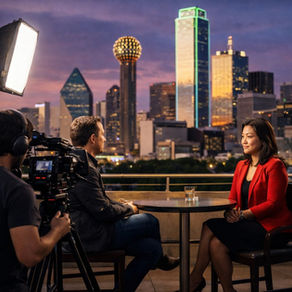The Essential List for Starting Your Videography Business
- Hunter Gregory

- Feb 16, 2023
- 3 min read
Are you ready to kickstart your videography business and start your dream job? Well I'd like to give some of my insight into some gear suggestions from my experience of being a full time videographer for the last 8 years. The gear will not make you a more talented/skilled videographer, but great equipment and the right equipment for the job will allow you to shoot BETTER videography more consistently. So here is a starter list of equipment you should get before you start charging the big bucks from your future potential clients.
Camera: Obviously, the first thing you need is a camera. Don't worry, you don't need to break the bank on a high-end model. Just make sure it has good video capabilities, such as 4K resolution, manual controls, and the ability to change lenses. I personally shoot Sony A7s3 and absolutely love my camera. I would recommend someone who is starting out but wanting to have a solid camera to buy a Sony a7iii or something similar and in that price range.
Lenses: Speaking of lenses, you'll need a few of them to cover all your bases. A wide-angle (24mm is probably my go to for establishing shots) lens for landscapes and establishing shots, a telephoto lens (I prefer 85mm or 135mm) for close-ups, and a fast prime, such as a nifty fifty lens for low-light situations.
Tripod: Don't underestimate the importance of a good tripod. It will help you stabilize your shots and ensure they're steady and smooth. It also allows you to get multiple angles when you don't have a second shooter on hand is fantastic for time lapses (my favorite). I would also highly recommend a Manfrotto monopod when you have some extra change laying around.
Lighting: Lighting can make or break a video, so make sure you have the right setup to light your scene or subject. A simple LED panel or two can make a huge difference in the quality of your footage. I shoot with a few different lights, all designed for each scenario.
Microphone: Sound is just as important as visuals in videography. A cheap shotgun mic can help you capture clear audio and reduce background and wind noise. A lapel would be the next purchase, since it is usually the most reliable for consistently good audio. I also use an inboard recorder when someone is speaking into a micro phone at events and I find that to be the best audio.
Batteries and memory cards: You don't want to run out of juice in the middle of a shoot or miss a crucial moment because your memory card is full. Make sure you have plenty of backup batteries and memory cards on hand.
Editing software: Once you've captured your footage, you'll need to edit it. There are plenty of options out there, from free software like iMovie to more professional options like Adobe Premiere Pro and my personal choice Final Cut Pro.
Backpack: Finally, you'll need a sturdy and spacious backpack to carry all your gear. Look for one with plenty of compartments and padding to keep your gear safe and organized. use a Pelican back pack for my shoots, it has enough room for 2 cameras with two lenses attached and a Mavic 3 drone + controller.
Starting a videography business can seem like a big chance as a career, but with the right gear, you'll be ready to take on those high paying clients and take on the world! That's the whole point of you starting a videography business right? Just remember to have fun, be creative, and keep learning and improving along the way. Good luck!
H&K Cinema
















Comments